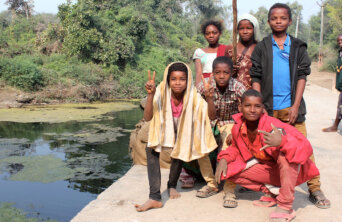- About
- Topics
- Story
- Magazine
- In-Depth
- Picks
- Opinion
- News
- Donate
- Signup for our newsletterOur Editors' Best PicksSend
Read, Debate: Engage.
| topic: | Indigenous people |
|---|---|
| located: | India |
| editor: | Bindu Gopal Rao |
With one look at the Siddi community members, it becomes evident that, though Indian in nationality, they look different from the majority of their Indian fellows, courtesy of their African genes (believed to be from the Bantu people of East Africa). Also called Habshis or Sheedi, there are about 250,000 people of the Siddi community throughout the states of Karnataka, Maharashtra, Andhra Pradesh, Goa and Gujarat.
It is believed that they first came to India in the 7th century with Arab merchants and in the 16th century with the Portuguese and British, largely as slaves, servants, blacksmiths, carpenters and masons. It is their descendants that live in the country today.
The Siddi dress like most rural Indians - the women wear saris and the men wear a shirt and lungi. Those in Karnataka speak Konkani and Kannada. The community has a mixed, creolised culture as far as food, music and spirituality is concerned. They also have a unique dance form called Dhamaal. Lately, the community has come to the limelight for their prowess in the sports arena.
Even though the community has lived in India for many centuries, few Indians know of them and unfortunately the community has been sidelined. They also face challenges like other rural communities including the lack of access to education, healthcare and to financial institutions. However, they are currently recognised as a Scheduled Tribe, which gives them some government benefits.
The community also has several challenges as they live in small groups in isolated spaces. In rural India where caste-based discrimination still exists, the Siddi community is often at the receiving end of racism as well. Many Siddi people live in forests and do not venture out, therefore isolating themselves further from the rest of society.
At the recently held Samvaad - a unique pan-Indian tribal conclave organised by the Tata Steel Foundation - the Siddi community sent members of their community not only to showcase their dance form but also to discuss the issues they face and how they could be resolved.
Changes in laws like the Forest Rights Act of 2006 have helped some members of the community to become landholders. To encourage their athletic side, many non-profit organisations have shown their support by organising training camps, providing nutritional food, training resources and facilities for upskilling.
Last month, a Siddi tribe member, Hirbai Ibrahim Lobi, was recognised as one of the winners of the fourth-highest civilian award of the Republic of India, the Padma Shri, for her work on women's empowerment. While this may seem like a small step, it is certainly a big win for the community that hopefully will be able to shake off the stigma and shine bright for who they are.
Image by Kandukuru Nagarjun

